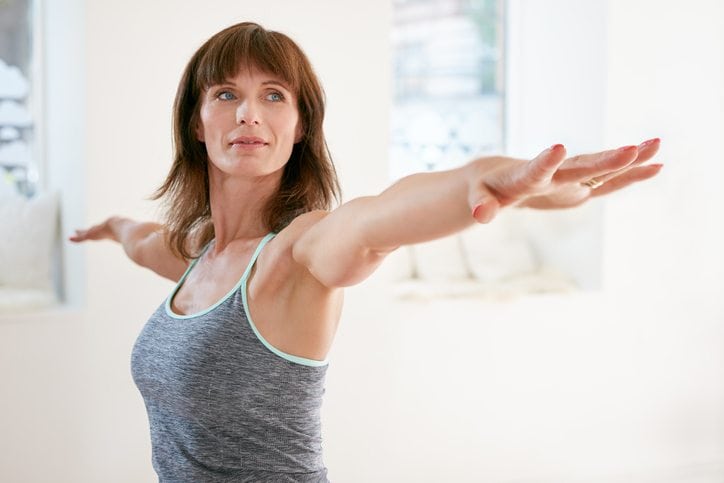Now more than ever it’s important to help keep your body’s immune system strong and healthy.
The team from Hartford HealthCare’s Bone & Joint Institute, including registered dietitian Christopher Barrett, nurse practitioner KellyAnn Kosma and clinical psychologist Peter Lucchio share several ways you can help boost your immune system through exercise, nutrition and stress reduction activities.
Note: The ideas listed below will help the immune system stay healthy, but they will not protect specifically against the COVID-19 virus.
Exercise
Regular physical activity can strengthen your immune system and help your body fight off infections and viruses. Aim for at least 30 minutes of physical activity three days a week. This can include walking, biking, yoga or other low-impact workouts. Studies show that high-intensity exercise can actually weaken the immune system. It is best to focus on low-intensity workouts. Regular exercise is associated with improved sleep, reduced stress and anxiety, and a lower risk of depression.
Nutrition
Nutrition plays an enormous role in our immune response. It’s one of the reasons we want to eat well daily. But during these hectic times our food choices and amounts consumed may look much different than just a few weeks ago. This may occur for a variety of reasons: lack of access (limited number of frozen vegetables or fruits available for purchase) or just the convenience of food during the Stay Safe, Stay Home initiative. To ensure our immune system is firing on all cylinders, we must make sure our plates are loaded with nutrient-rich foods.
One of the larger stressors on the body is limiting our overall calories too much. During these times, it’s important to consume adequate calories from high-quality food sources. Your plate, for example, should include a mix of meat, vegetables and whole grain rice. If you are unable to eat vegetables as part of a meal, look for a piece of fruit, which also contains loads of vitamins and minerals as well.
In contrast, do not overeat. Being cooped up in the home can be challenging. The increasing stress and anxiety can cause emotional eating. When considering how many calories you should consume use the Goldilocks Principle: not too much, not too little, but just enough.
Vitamin C is an antioxidant and is abundant in many fruits and vegetables. It is involved in maintaining a high functioning immune system by reducing cellular damage caused by free radicals. However, taking high doses of vitamin C is unlikely to enhance your immune response.
Food Sources: Orange, red or yellow fruits or vegetables such as cantaloupe, red/yellow peppers, sweet potatoes, strawberries and tomatoes. You can also find vitamin C in green produce such as broccoli and kiwi.
Lean protein sources should be another staple of diet. Many sources contain glutamine (an amino acid), a building block for immune cells.
Stress and Immune Function
There is a closely linked relationship between emotional stress and immune function. A wide variety of maladies, including stomach upset, hives and even heart disease, are linked to the effects of emotional stress. The field of psychoneuroimmunology is dedicated to the understanding and treatment of this problem.
Research has indicated that being continuously exposed to perceived stressors may contribute to chronic activation of the sympathetic nervous system. Based on this research, we now know that chronic sympathetic arousal degrades the functioning of the thymus gland via persistent circulation of glucocorticoids (such as cortisol). Managing and reducing stress will help support immune function.
Ways You Can Reduce Stress at Home
Mindfulness Meditation: Mindfulness has been defined as “paying attention in a particular way: on purpose, in the present moment, and nonjudgmentally.” Basic elements include efforts to cultivate awareness via concentration on sensory experience, approaching emotions and thoughts with acceptance, non-judgment, and equanimity, as well as activity relating to self and others with compassion.
Diaphragmatic Breathing : Changing the way we breathe can contribute to either an excitement/fear response (sympathetic activation) or a calming response (parasympathetic activation). We know that spreading out inhalations and exhalations can flip our body into a more calm state. Box breathing is a simple and effective method to change how we breathe in an effort to calm the body. This exercise can be done discreetly and in a variety of contexts. The practice is inhaling for three seconds, holding the breath for three seconds, exhaling for three seconds and holding the breath for three seconds. This cycle can be repeated multiple times. Or time intervals during the cycles can be changed to reach the desired effect.
Guided Imagery: Guided imagery is a mental exercise that invites users to recreate the experience of being in a relaxing and/or safe place. Once a user is able to identify a safe/relaxing place – preferably somewhere in nature – they can begin to immerse themselves in the experience by identifying visual, auditory, tactile/temperature and scent-based/olfactory parts of the experience.
Here are some examples of smartphone applications that people can utilize:
Headspace is offering a free subscription to Headspace Plus through 2020 for healthcare providers. You just need your NPI number to get started. Check it out here.
Ten Percent Happier is offering healthcare providers six months free. Details can be found here. They also have daily live meditations at 3 pm (saved and available afterward in the app if you can’t be present for the live session). There’s a podcast on handling coronavirus anxiety, guided meditations, and other recordings.
Calm has created a curated page offering free meditations, Sleep stories, a Masterclass by Elizabeth Gilbert, and other resources. Take a look here.
Best Physical Activities for Stress Reduction
Yoga: Yoga is a practice of breathing, mindfulness, spirituality, body, and the connection among these factors. Through its three main components (postures, breathing, and meditation), as well as nonspecific events, yoga appears to be safe and to improve multiple parameters of health and quality of life.
Tai chi/Qi Gong: Tai chi is a form of mind-body exercise that originated in China and involves martial arts, meditation, and dance-like movements that focus on the mind and body connection.
For information on Hartford HealthCare’s Bone & Joint Institute, click here.
Click here to schedule a virtual visit with a Hartford HealthCare-GoHealth Urgent care doctor.
Stay with Hartford HealthCare for everything you need to know about the coronavirus threat. Click here for information updated daily.
Questions? Call our 24-hour hotline (860.972.8100 or, toll-free, 833.621.0600).
Get text alerts by texting 31996 with COVID19 in the message field.


